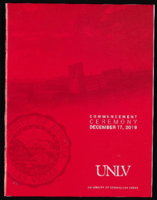Search the Special Collections and Archives Portal
Search Results

Interview with James Nobuo Yamazaki, October 14, 2005
Date
Archival Collection
Description
Text

Transcript of interview with Cynthia Cicero, Tina Boag, Betty Brown, and Jan Ravetti by Claytee D. White, March 28, 2014
Date
Archival Collection
Description
Text

Zoe Albright oral history interview: transcript
Date
Archival Collection
Description
Oral history interview with Zoe Albright conducted by Barbara Tabach on October 16, 2018 for the Remembering 1 October Oral History Project. In this interview, Albright describes her work as a volunteer for the Red Cross and helping comfort those who came into the Metro Police Station after the 1 October shooting, searching for family and friends who were present at the Route 91 Harvest Festival. In addition to being a Red Cross volunteer, Albright is also a personal trainer, nutrition consultant and resident of Las Vegas since 1988.
Text

University of Nevada, Las Vegas (UNLV) Fall 2019 commencement program
Date
Archival Collection
Description
Commencement program from University of Nevada, Las Vegas Commencement Programs and Graduation Lists (UA-00115).
Text

Transcript of interview with Randy Garcia by Laurents Bañuelos-Benitez, November 27, 2018
Date
Archival Collection
Description
Randy Garcia is the founder and CEO of the investment management-consulting firm, The Investment Counsel Company. Born in Los Angeles on Feb. 21, 1954, Garcia’s family moved to Las Vegas in 1957. The son of a World War II vet and a homemaker, Garcia’s ancestral roots come from Mexico, Italy, and Spain. He grew up in Las Vegas during segregation and expansion. He remembers a time when much of city included dirt lots and casinos that no longer stand. A champion in serving under privileged youth and communities across southern Nevada, Garcia lives by the philosophy, “give until it hurts.” Garcia uses his success as a wealth manager to promote, foster, and cultivate positive change for the Latinx community in Las Vegas. His story and dedication to his community is a pinnacle of hope and benevolence for current and future generations. Garcia became the first in his family to attend and graduate college. He graduated from UNLV in 1977 with honors, where he majored in business administratio
Text

John Robinson Pacheco interview, June 24, 2019: transcript
Date
Archival Collection
Description
Interviewed by Laurents Bañuelos-Benitez. John Pacheco's father, Francisco, arrived in Las Vegas in 1942. John was born in 1947 and raised mostly on 27th Street. He is a graduate of Rancho High School and UNLV. He is a retired artist known for hand-painting signage for many local businesses. As a very civic minded person, John has received many local awards and served on committees for the Las Vegas Chamber of Commerce, East Las Vegas community, and much more.
Text

Autumn Keyes Ita interview, February 26, 1980: transcript
Date
Archival Collection
Description
From the Ralph Roske Oral History Project on Early Las Vegas, OH-01017. On February 26, 1980, collector Steven McKenzy interviewed Clark County Community College coordinator of rehabilitation, Autumn Keyes Ita (born December 8th, 1936 in Port-au-Prince, Haiti) at the Clark County Community College. This interview offers a personal historical account on home and family life in Las Vegas, Nevada. Autumn also discusses entertainers such as Wayne Newton and Sammy Davis, Jr., and the role that entertainment played in the development of Southern Nevada.
Text

Transcript of interview with Alice Doolittle by Christopher Moran, March 21, 1977
Date
Archival Collection
Description
On March 21, 1977, Christopher Moran interviewed Alice Doolittle (born 1897 in Boston, Massachusetts) about her experiences while living in Nevada. Also present during the interview is Ruth Belding, Alice’s daughter. Doolittle first talks about her reasons for coming to Las Vegas and her eventual occupation as a dental assistant. She also talks about her family’s history of living on the Stewart Ranch and the ranch’s swimming pool that attracted many during the summers of Las Vegas. Doolittle also describes her move to Boulder City with her husband, the first theaters in Las Vegas, and the Union Pacific Railroad. At the end of the interview, the three discuss Helen Stewart, Harley Harmon, and the Doolittle Center, named after Doolittle’s late husband, Ferris Doolittle.
Text

Transcript of interviews with Al Levy by Cheryl Caples, February 23, 1979 and by Martha Zehnder, March 8, 1981
Date
Archival Collection
Description
Part I: Interview with Al Levy by Cheryl Caples on February 23, 1979. At the time of this interview, Levy was serving on the city commission (now the Las Vegas City Council). He talks about growing up in Las Vegas and attending Las Vegas Grammar School (Fifth Street School) and Las Vegas High School. He mentions the Helldorado events, recreational activities, and raising a family in Las Vegas. Part II: Interview with Al Levy by Martha Zehnder on March 8, 1981. Levy recalls much of the same information as the previous interview, and again talks about his schooling and attending the University of Southern California. He returned to Las Vegas to assist his father with his grocery stores. Levy talks about the polio epidemic as the reason that children were not allowed to swim at public or hotel pools. He discusses his real estate firm, Levy Realty Company, his involvement in the community and the Jaycees (Junior Chamber of Commerce), and the booming hotel industry. Levy also discusses some city leaders he's known, including Mayor Gragson. He talks about his Jewish faith and having to go to Los Angeles to train for his bar mitzvah because there were no rabbis living in Las Vegas.
Text

Transcript of interview with Andrew and Debbie Levy by Barbara Tabach, September 12, 2016
Date
Archival Collection
Description
Andrew (Drew) Levy was born and raised in Las Vegas, Nevada, where his family became prominent civic and real estate leaders. His grandfather was Harry Levy, a former Las Vegas City Commissioner, and his father Alvin Levy was a former councilman. Drew is always proud to say that he never left Las Vegas and of partnering with his father in the Levy Realty Company. While growing up, Drew it was easy for a teenager to enjoy the perks that could accompany his family?s civic persona?such as casino shows, events and meeting early Las Vegas casino executives like Moe Dalitz. After graduation from Clark High School, Drew attended Arizona State University. It was in Tempe that he met Debbie Cheek, his future wife. When Debbie arrived in Las Vegas, she enrolled at the University of Nevada, Las Vegas, where she finished her degree and started her accounting practice. She ran her business for ten years before opening Art Starts Here, an art school. In the 1990s, Debbie?s passion for art led her to be involved in the creation of First Friday, a local monthly art festival. She also teaches a summer art camp for the Adelson Educational Campus. Drew and Debbie became deeply involved in the many Jewish congregations in Las Vegas. Blossoming first at Temple Beth Sholom where they were married in 1980, Debbie sat on the preschool board and oversaw the temple board, while Drew was the advisor for the youth group. The couple later joined Congregation Ner Tamid where Drew was congregation president from 1999 to 2000 and Debbie was board treasurer in 2001. Debbie includes stories of her conversion to Judaism and keeping kosher. In this interview, Drew and Debbie Levy reflect on changes they see in Las Vegas, from when Drew was a kid to the times they raised their own daughters, Sarah and Jenna, here. Looking at the larger picture of the city, they describe booms in the real estate market and growth in the artistic and cultural aspects of Las Vegas. They provide a perspective of the growth of the local Jewish community.
Text
